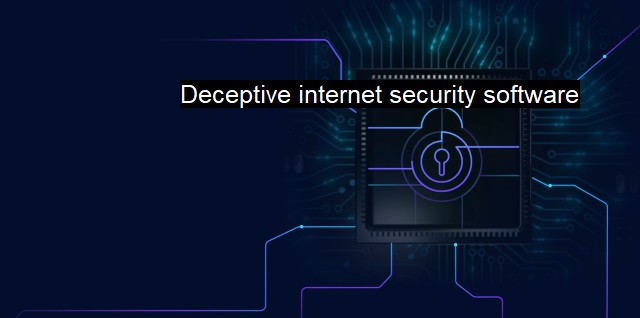What is Deceptive internet security software?
The Scary Truth About Deceptive Internet Security Software: What You Need to Know to Protect Yourself from Rogue Antiviruses and Scammers
Deceptive internet security software, sometimes known as "scareware" or "rogue security software", represents a potentially severe threat within cybersecurity landscapes. Cybercriminals primarily utilize this form of software to trick or scare users into purchasing and downloading malicious software, mainly under the guise of helping safeguard their systems or data. By doing so, they not only defraud users but also gain unauthorized access to personal information and potentially, control over their systems.Typically, deceptive internet security software mimics genuine antivirus or anti-spyware software's interface. It disturbs users with frequent, alarming notifications claiming that the system is infected with various security threats like viruses, worms, Trojan horses, etc. Such warnings seem so convincing and perilous that users feel an immediate sense of danger about severe system damage or personal data loss.
In panic due to these fraudulent alerts, users are often manipulated into purchasing the full version of the counterfeit software. Unfortunately, these are nothing more than surface-level application interfaces with no genuine capacity to detect or eliminate any security threats. Consequently, users who follow their instructions end up paying money for a tool that provides no real protection.
Upon installation, this rogue software often contributes to more severe damages. In addition to defrauding people financially, it typically functions as a trojan, making way for an extensive range of malware threats, including ransomware, keyloggers, or even botnets. Once such malware infects the system, it opens various threats like systematic damage, data theft, or data encryption with a ransom demand.
Further, it can lead to exploitable system vulnerabilities, where cybercriminals can easily gain unauthorized access. Users' sensitive information like usernames, passwords, credit card details, and other personal data could come under risk. Cybercriminals could then use this stolen information for harmful activities such as identity theft, unauthorized transactions, or even selling data on the dark web.
Adopting precautions is of prime importance to protect oneself against these very-real cybersecurity threats. User awareness regarding these deceptive practices plays a crucial role in preventing unsolicited software installations. A discerning user should question unusual pop-ups urging immediate action, avoid clicking on suspicious links, and download software only from authentic sources. Regular updating of legitimate antivirus software and operating systems is equally essential for robust security and up-to-date threat detection.
a reliable backup routine can spare users unfortunate outcomes from malware attacks, including ransomware. In case of inadvertent installation of such rogue software, one should avoid further navigation or transactions on the suspected device. Instead, they should use a different, secure device to change all passwords and notify the respective bank, credit card, or service providers about potential unauthorized access.
Deceptive internet security software is a dangerous form of cyber attack that preys on fear, urgency, and unawareness. By masquerading as legitimate security software, it defrauds users and exposes them to severe cybersecurity issues. Therefore, heightened user awareness and proactive security measures are indispensable in staying safe from such cyber threats. It is crucial to promote the essentiality of cybersecurity hygiene at individual and organizational levels in this modern digital age, where threats are continually evolving and intensifying.

Deceptive internet security software FAQs
What is deceptive internet security software?
Deceptive internet security software is a type of malicious program that disguises itself as legitimate antivirus or security software. It tricks users into downloading and installing it onto their computer or device, and then presents fake security warnings or notifications to encourage the user to purchase a full version of the software.How does deceptive internet security software work?
Deceptive internet security software typically spreads through various forms of online advertising, including pop-up ads, banner ads, and sponsored search results. Once installed, it may use scare tactics or other manipulative techniques to convince users that their computer is infected with malware, and that the only solution is to purchase the full version of the software.What are some common signs of deceptive internet security software?
Some common signs of deceptive internet security software include constant pop-up warnings or notifications about supposed security threats or infections, aggressive marketing tactics to encourage the purchase of a full version of the software, and requests for personal or financial information. Additionally, the interface and layout of the software may be poorly designed or mimic the look of legitimate security software to further deceive users.How can I protect myself from deceptive internet security software?
To protect yourself from deceptive internet security software, be cautious when downloading and installing any programs or software from the internet. Only download software from trusted websites and sources, and always use reputable antivirus software to scan your computer for potential threats. If you suspect that your computer has been infected with deceptive security software, seek the assistance of a qualified cybersecurity professional to remove the program and ensure the security of your system.| | A | | | B | | | C | | | D | | | E | | | F | | | G | | | H | | | I | | | J | | | K | | | L | | | M | |
| | N | | | O | | | P | | | Q | | | R | | | S | | | T | | | U | | | V | | | W | | | X | | | Y | | | Z | |
| | 1 | | | 2 | | | 3 | | | 4 | | | 7 | | | 8 | | |||||||